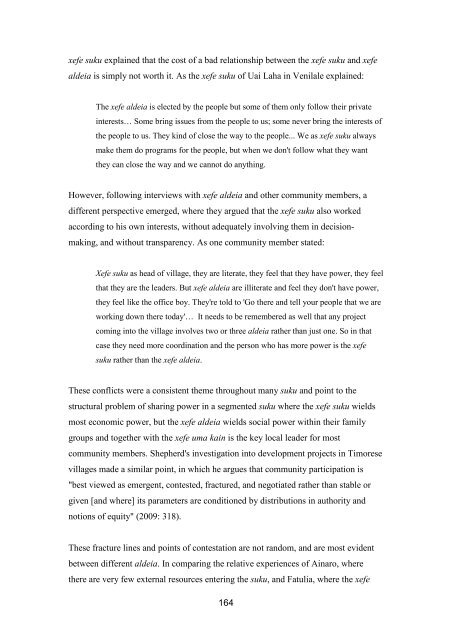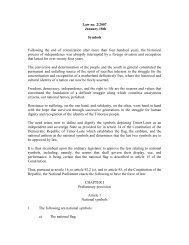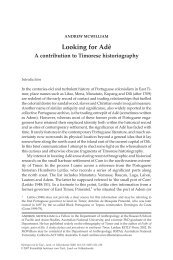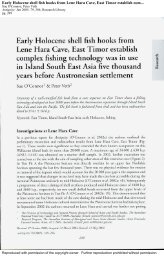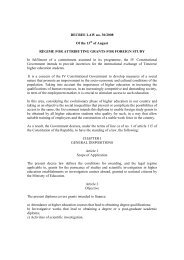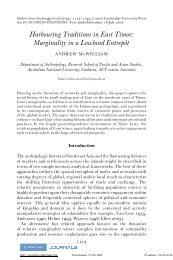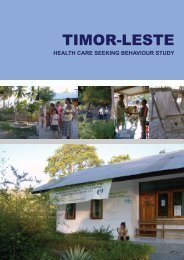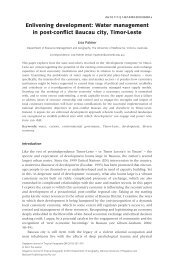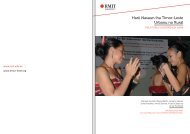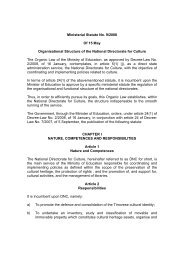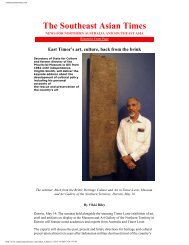Local Governance in Timor-Leste - Secretaria de Estado da Arte e ...
Local Governance in Timor-Leste - Secretaria de Estado da Arte e ...
Local Governance in Timor-Leste - Secretaria de Estado da Arte e ...
- No tags were found...
You also want an ePaper? Increase the reach of your titles
YUMPU automatically turns print PDFs into web optimized ePapers that Google loves.
xefe suku expla<strong>in</strong>ed that the cost of a bad relationship between the xefe suku and xefeal<strong>de</strong>ia is simply not worth it. As the xefe suku of Uai Laha <strong>in</strong> Venilale expla<strong>in</strong>ed:The xefe al<strong>de</strong>ia is elected by the people but some of them only follow their private<strong>in</strong>terests… Some br<strong>in</strong>g issues from the people to us; some never br<strong>in</strong>g the <strong>in</strong>terests ofthe people to us. They k<strong>in</strong>d of close the way to the people... We as xefe suku alwaysmake them do programs for the people, but when we don't follow what they wantthey can close the way and we cannot do anyth<strong>in</strong>g.However, follow<strong>in</strong>g <strong>in</strong>terviews with xefe al<strong>de</strong>ia and other community members, adifferent perspective emerged, where they argued that the xefe suku also worke<strong>da</strong>ccord<strong>in</strong>g to his own <strong>in</strong>terests, without a<strong>de</strong>quately <strong>in</strong>volv<strong>in</strong>g them <strong>in</strong> <strong>de</strong>cisionmak<strong>in</strong>g,and without transparency. As one community member stated:Xefe suku as head of village, they are literate, they feel that they have power, they feelthat they are the lea<strong>de</strong>rs. But xefe al<strong>de</strong>ia are illiterate and feel they don't have power,they feel like the office boy. They're told to 'Go there and tell your people that we arework<strong>in</strong>g down there to<strong>da</strong>y'… It needs to be remembered as well that any projectcom<strong>in</strong>g <strong>in</strong>to the village <strong>in</strong>volves two or three al<strong>de</strong>ia rather than just one. So <strong>in</strong> thatcase they need more coord<strong>in</strong>ation and the person who has more power is the xefesuku rather than the xefe al<strong>de</strong>ia.These conflicts were a consistent theme throughout many suku and po<strong>in</strong>t to thestructural problem of shar<strong>in</strong>g power <strong>in</strong> a segmented suku where the xefe suku wieldsmost economic power, but the xefe al<strong>de</strong>ia wields social power with<strong>in</strong> their familygroups and together with the xefe uma ka<strong>in</strong> is the key local lea<strong>de</strong>r for mostcommunity members. Shepherd's <strong>in</strong>vestigation <strong>in</strong>to <strong>de</strong>velopment projects <strong>in</strong> <strong>Timor</strong>esevillages ma<strong>de</strong> a similar po<strong>in</strong>t, <strong>in</strong> which he argues that community participation is"best viewed as emergent, contested, fractured, and negotiated rather than stable orgiven [and where] its parameters are conditioned by distributions <strong>in</strong> authority andnotions of equity" (2009: 318).These fracture l<strong>in</strong>es and po<strong>in</strong>ts of contestation are not random, and are most evi<strong>de</strong>ntbetween different al<strong>de</strong>ia. In compar<strong>in</strong>g the relative experiences of A<strong>in</strong>aro, wherethere are very few external resources enter<strong>in</strong>g the suku, and Fatulia, where the xefe164


